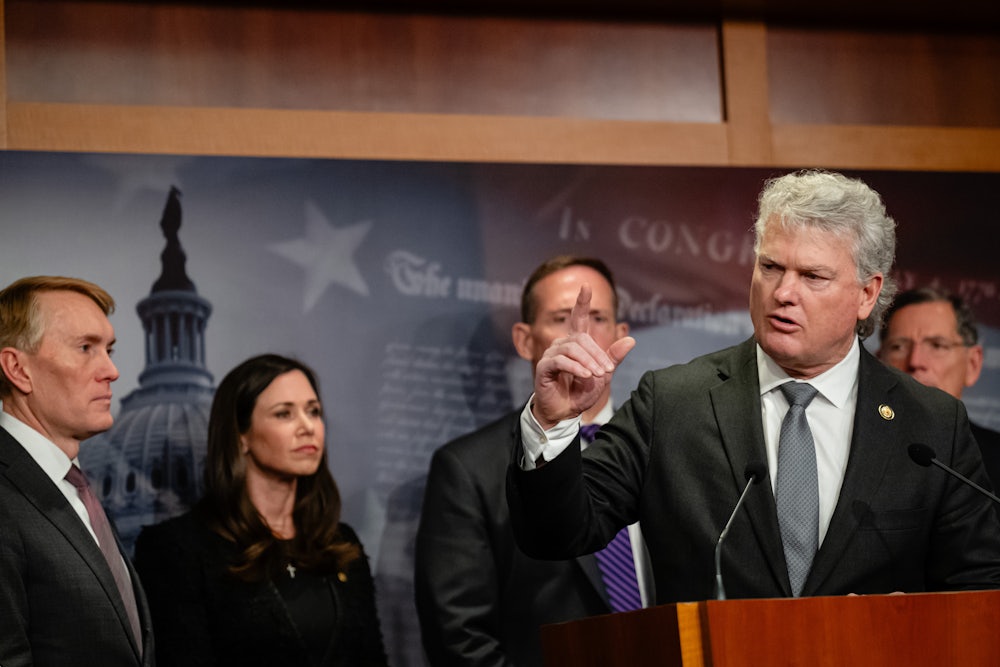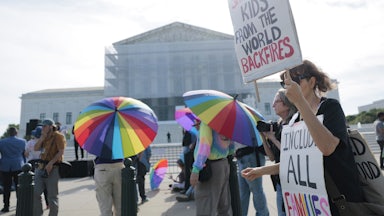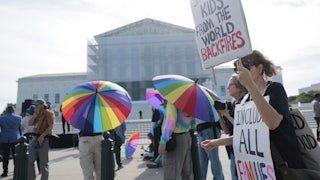Nothing about the Laken Riley Act, the anti-immigration law that passed the House last week and is now being taken up in the Senate, would have prevented the murder of the young Georgia nursing student for whom it was named. But the appropriation of her death by anti-immigration hard-liners felt inevitable: As soon as law enforcement said last February that an undocumented immigrant was their suspect, Republicans seized on the story—one of many right-wing attempts to link the Biden administration with “migrant crime,” stoke moral panic, and propel Trump to the White House. Now Republicans have found a startling number of Democrats to support their crackdown: The Laken Riley Act is on track to become one of the first bills Trump will sign into law.
The bill, originally introduced shortly after Riley’s murder in 2024, aims to do two things: First, it creates a new mandate for the detention of immigrants—primarily but not only undocumented immigrants—for merely being arrested for a number of low-level theft-related offenses. And second, it affords sweeping new powers to state attorneys general to potentially override federal immigration policy, allowing them to sue agencies for—in their eyes—failing to detain immigrants, or to even sue the State Department for allowing visas from a given country if that country refuses to reaccept citizens that Immigration and Customs Enforcement deports.
None of this would have saved Laken Riley. The man convicted of Riley’s murder, Jose Ibarra, entered the United States in 2022, along with his wife and young son, at the southern border, where he was detained by ICE. Ibarra was released while his asylum claim was processed—something which is very common, and which can take a long time, as there are hundreds of thousands of people awaiting asylum decisions. He reportedly had two encounters with law enforcement while his case proceeded: In New York, he was arrested for driving a scooter without a license, along with having a child passenger riding without a helmet. He was later issued a citation for shoplifting about $200 worth of food and clothing from a Georgia Walmart, according to police in Athens-Clarke County; they also said citation and release is standard practice in such cases. As Steve Kennedy pointed out earlier this week at TNR, “The Laken Riley Act does require federal authorities to detain arrested immigrants if they are not being held by local police, but it has no requirements for the police themselves, so there is nothing in this proposed law that would have compelled them to detain Ibarra.” (Of course, if police were to be compelled to detain individuals like Ibarra who would otherwise be released due to the prior charges being low-level criminal offenses, they would be holding them based on their status as an immigrant, alone.)
So what would this bill accomplish? First of all, because of the discrepancy between mandate and funding, it may immediately overload the federal immigration detention system. ICE says they lack the capacity to lock up everyone this bill now designates as a mandatory ICE detainee. According to Axios, ICE officials told Congress their budget is for “42,000 beds,” and they say they have 39,000 people in immigration detention now; they told Democratic Senator Dick Durbin’s office that they identified nearly 67,000 people they would be required to detain if the bill passed. ICE officials also reportedly told Congress they would need $3.2 million for detention centers and officers in order to enforce the Laken Riley Act. As it stands, the act contains no additional funding.
The bill’s vast expansion of mandatory detention, the way it casts suspicion on immigrants, all this is fuel for xenophobic harassment and threats in the name of “public safety” and Laken Riley. “The concern, of course, on the ground is that this could be used by unscrupulous employers or abusive husbands and spouses to threaten people,” Aaron Reichlin-Melnick, a senior fellow at the American Immigration Council, told me: “threatening to report them for a theft, and in the hopes that they would then be arrested and then ICE would be required to prioritize taking that person into custody. And then that person would be ineligible for release on immigration bond.” They would likely be eligible for bail and release, as far as the underlying criminal charge is concerned, but practically speaking, they would be denied that right. They could even be deported before that case made it to court, another due process violation. While this bill has been widely reported as targeting undocumented immigrants, Reichlin-Melnick underscored that “in some narrow circumstances, some people with visas or permanent resident status” could also fall under the scope of the bill.
This is already a problem for undocumented immigrants in the criminal legal system—where these theoretically two separate parts of the legal system intersect. As Silky Shah, executive director of Detention Watch Network, explained when we spoke last week, there are multiple points where ICE can pull an undocumented person moving through the criminal legal system into immigration detention and deportation proceedings instead. “At every single stage, whether it’s the initial interaction, the booking process—especially the booking process is a place where a lot of people get caught up—but also when they’re in the jail, sometimes they’re interacting with an ICE agent, and once they go to trial, they might be referred to a U.S. attorney for prosecution.” This bill, she said, “it’s really expanding the possibility of that happening.” It’s expanding something that is already happening. Under the Laken Riley Act, Shah explained, the detention and deportation process could all start at the first point of contact with law enforcement. “What this bill does is say, actually, we’re not even going to go through the process of this person actually being convicted of said crime. We’re going to say that as soon as somebody’s charged, we’re going to go ahead and put them into deportation … and also, we’re requiring it.” All this is largely absent from the public debate on the bill, which emerged from anti-immigrant rhetoric divorced from the reality of the criminal legal system.
The second part of the bill has itself almost entirely been subsumed in the limited debate over due process and mandatory detention. Reichlin-Melnick explained that while the mandatory detention provision essentially overrides immigration officers’ and judges’ discretion about who to detain or release, there’s far more than that in the bill. It also gives power to state attorneys general to dictate immigration enforcement, if that state or its residents “experience harm.”
What does that look like? Reichlin-Melnick imagined this scenario: “Texas has a number of sheriffs who are very, very, pro-deportation,” including some who have sued the Biden administration in the past, challenging immigration policy, “alleging that they are not detaining enough people.” If one of those sheriffs sees that officers have arrested some people who may be undocumented on misdemeanor shoplifting offenses but ICE hasn’t come to pick those people up, that sheriff then phones “his good friend Ken Paxton”—the Texas attorney general—“and says, Ken, I have all these people here. We detained them. They were arrested for shoplifting. You know, they’re in our jail right now, awaiting a bail hearing, and ICE isn’t here, and ICE should be here to pick up. Under this Laken Riley Act, it could see a very good argument that Ken Paxton could then go to federal court, sue ICE, and say, ICE, you are violating the requirements of this law, and you have to come pick these people up.” Or say ICE did pick them up, and an immigration judge released them, as judges currently have the discretion to do (but would not under the Laken Riley Act). A state attorney general could potentially sue the Department of Justice, said Reichlin-Melnick. Is the failure to detain someone who is undocumented and accused of stealing a pack of gum “harming” a state? That’s the argument. “Harm” in the bill is defined broadly, which will help those suits make it past the inevitable, reasonable challenges to their standing. And there could be lots of these lawsuits, particularly from attorneys general who have already filed federal lawsuits challenging immigration policies, like Paxton. This could create chaos in the courts, giving a state attorney general a legal cudgel to try to get the kind of immigration enforcement they want.
Reichlin-Melnick said that the Laken Riley Act would also allow state attorneys general to file federal lawsuits against the U.S. secretary of state, in an attempt to force the State Department to deny visas to citizens from so-called “recalcitrant” countries who refuse to accept their own citizens when deported by the United States. The thinking apparently goes: If, say, Venezuela denies deportations from the U.S., then the State Department ought to ban all Venezuelans from entering the U.S., and if the State Department doesn’t ban them by denying those visas, then any state attorney general can try to overrule its decision by suing it.
Given all this, you could well conclude that the Laken Riley Act appears poorly constructed—more a public statement than a piece of policy. It has at least one immigration attorney begging senators to “sit down and take the time to read it.” Then again, from another angle, the bill appears to be serving precisely the function its right-wing backers intended: to sell the public on the idea that immigrants are endangering Americans and that any response is justified.
“All of this just lends itself to this idea that immigration is a public safety issue, which it’s just not,” Shah told me. “It’s a lie that’s constantly told to us.” The act is a key component of Trump’s plan premised on such lies: to carry out, on day one, the largest mass deportation operation in the history of the United States. “Making federal policy that says anybody who’s charged with a crime and doesn’t have any right to due process could be detained and then eventually deported is really disturbing,” said Shah. “That just opens up so much more space for them to do what Trump’s been promising.” Passing a law like this, she added, “it signals to people that it’s OK to target these individuals.”
While the bill seizes on misconstrued details of Laken Riley’s murder, it’s rooted in a recent wave of anti-immigrant scapegoating in the U.S., fueling the idea that every “criminal” immigrant should be deported and that any immigrant can be a criminal. “It’s a tragedy,” Shah said. “It’s trying to do the thing that all moral panics do, which is, Let’s just apply this very specific instance to a broad set of people and then just balloon the system even more in order for all these politicians to gain political legitimacy—which of course includes Democrats now, unfortunately.” Republicans pitched the law as a way to blame Democrats for Riley’s murder; Democrats may not accept that, but they are capitulating nonetheless.
In helping advance this law, Democrats are giving credence too to some of the most xenophobic rhetoric of the past few years. Alabama Republican Senator Katie Britt, who proposed the Laken Riley Act shortly after Riley was murdered, used her response to President Biden’s State of the Union address a few weeks later to blame Biden for the death. “This could have been my daughter. This could have been yours,” said Britt. Trump joined in the “your daughter” rhetoric at a campaign event soon after Georgia. “I will fight like no one has ever fought before to ensure that what happened to this American daughter, this incredible American, that this never happens to any other daughter or anyone else ever again,” Trump said. He pledged to protect “suburban housewives,” who “don’t want illegal immigrants coming into this country.”
Trump has already surrounded himself with staff eager to take these policies even further: In an interview with NBC News last week, Trump’s “border czar” Homan said he is “considering” a hotline for “American citizens” to report undocumented immigrants. He added that when undocumented immigrants suspected of a crime are arrested, if other undocumented people are with them—such as family members—they should also be arrested. Seated before a section of border wall, wearing what appeared to be a thin-blue-line flag lapel pin, Homan called “the results of mass deportations more important to this country than anything—I don’t put a price on Laken Riley’s life.” Homan, who was Trump’s acting ICE director from 2017 to 2019, spent months during the Trump campaign calling for mass deportations. He is “considering” conscripting anyone who wants to join him in kicking off mass deportations by reporting people so that immigration enforcement agents, including any law enforcement officers deputized as immigration enforcement, can arrest them and put them into deportation proceedings. He says he is doing this because the life of Laken Riley was priceless.
Rhetorically, the story of Laken Riley has primed people to accept the arrest and indefinite detention of any immigrant suspected of being undocumented and/or having committed a crime. It has done so by activating a script deep in the American story: the protection of white women’s innocence, at all costs. Throughout our history, Americans have crossed their own imagined moral line to allow “what appears to be unconstitutional arbitrary detention, as long as it is done to immigrants,” noted Andrea Pitzer, author of One Long Night: A Global History of Concentration Camps, in an essay this December. As Trump’s second Inauguration Day approaches, many Americans are thinking about what sorts of moral lines the new administration may try to cross, and what it will mean for ordinary people to attempt to hold them back. Democrats entertaining this destructive bill are also demonstrating what little they will do to help hold that line. They are saying they don’t even know what side of that line they are on.






